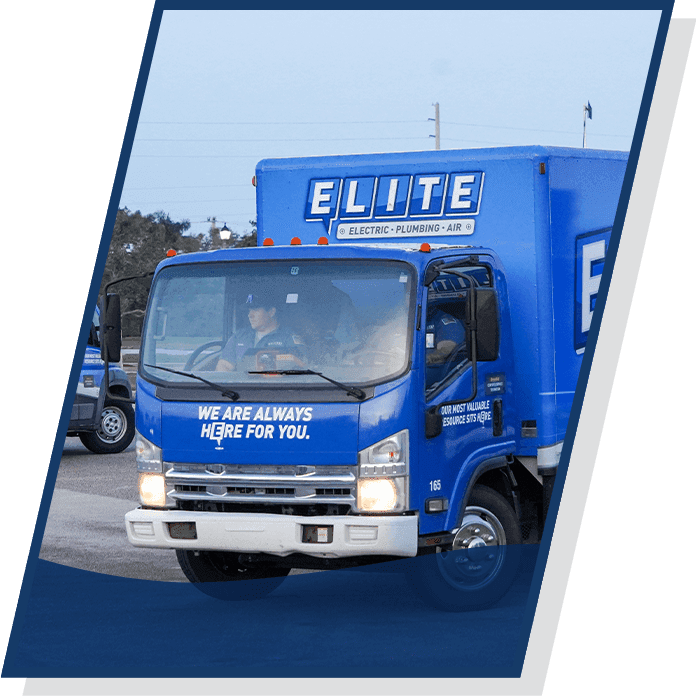
Generator Services in Port St. Lucie
Generator Installations, Repairs, and Replacements in Port St. Lucie, Jupiter & the Surrounding Areas
Generators are designed to supply electricity to our homes when the power goes out or when your local utility company has a malfunction that leaves you without electricity. It is in your best interest to invest in timely generator repair or replacement solutions if your unit seems to be wearing out or isn’t working reliably.
If you’re having trouble with your generator or are looking to install one, get in touch with our trusted team at Elite Electric, Plumbing & Air. We’ve been providing dependable electrical solutions in your community since 1988 and are prepared to handle all your generator needs, including the installation of cutting-edge Goal Zero units.
With 24/7 emergency support and a 100% satisfaction guarantee, you can expect quality solutions that provide power when you need it most. Call (772) 356-1735 or contact us online to schedule superior generator services in Port St. Lucie today.
How Can You Tell When You Need Generator Repairs?
Confirming that your generator is working properly ahead of time is essential to providing your home with electricity in the event of power outage. Regular monitoring can help identify underlying issues before they escalate into more significant problems.
Here are several signs that your home’s generator may need professional repairs:
- Strange sounds. If your generator starts making unusual noises, such as grinding or excessive rattling, it may have loose components or sustained internal damage. Ignoring these sounds may lead to further issues, potentially resulting in complete generator failure. Any mechanical failures will need to be resolved before your unit can operate effectively.
- Frequent stalling or failing to start. Turn your generator on once every few months to check if there is anything obviously wrong. If it’s struggling to start consistently or stalls, you are likely dealing with a problem that requires professional help. The issue could stem from fuel system blockages, battery issues, or failing electrical components.
- Inconsistent power supply. A generator that delivers an inconsistent power supply, such as flickering or fluctuating voltage, may have underlying electrical issues. This can affect not only the generator's performance but also the devices connected to it, leading to potential damage.
- Fuel leaks. Any visible signs of fuel leaks around the generator are a serious concern. Fuel leaks can pose fire hazards and indicate problems with seals or other components.
- Increased emissions or smoke. If you observe excessive exhaust emissions or see smoke coming from your generator, do not wait to call in the professionals. Your unit could be suffering from a serious engine problem that requires immediate expert evaluation.
- Physical damage. If your generator looks like it has sustained physical damage, either as a result of human negligence or severe weather, you should call for a professional inspection.
- Warning lights. Modern generators often come equipped with warning systems that alert users to operational problems. If you see warning lights indicating low oil levels, overheating, or other issues, consult a technician to diagnose and repair the problem promptly.
The easiest and best way to keep an eye on your generator is to schedule annual maintenance inspections with a qualified generator repair specialist. Our generator services in Port St. Lucie include comprehensive maintenance that can be scheduled at your convenience.
What Size Generator Will Power My House?
Choosing the right size generator for your home is essential to making sure you have an adequate power supply during outages. When determining the appropriate size, you should consider several factors, including your household's electrical needs, the wattage of your appliances, and how many devices you want to run simultaneously.
Generators are usually rated in watts, and they come in various sizes, commonly ranging from under 1,000 watts to 20,000 watts and beyond. For an average home, a generator in the range of 5,000 to 7,500 watts can power essential appliances like lights, refrigerators, and heating systems. However, if you want to run larger appliances (like central air conditioning units) or multiple high-wattage devices at once, you may need a generator rated at 10,000 watts or more.
Taking the time to properly evaluate your power needs and understanding generator capabilities will help you select the right size to keep your home powered when it matters most. Our generator specialists at Elite Electric, Plumbing & Air can assess your specific requirements and work closely with you to choose the best option for your situation. We can also help you consider factors like your home's wiring, the integration of the generator into your existing electrical system, and local regulations regarding generator installation.


Our Reviews See What Our Customers Say
-
"We are now regular customers!"
He was very respectful of the cleanliness of our home and made sure he had booties on when he was indoors.
Ginger Swymer -
"He was professional and informative. Highly recommended."
Anthony was the plumber, he was great! Educated us on how to fix issues by ourselves if we needed and solved our problem immediately.
Joe C. -
"Elite was able to come and quote me the SAME DAY."
He was very trustworthy, understanding, appreciative and knowledgeable about everything. He always gave me the extra information you seem to forget to ask during the consultation.
Amanda L. -
"Elite has employees they can be proud of!"
From my first call to the office speaking with Evelyn, to the professionalism of Vinny, our plumber, Elite has earned a new customer.
Mike M. -
"A+, 10/10, would recommend to family and friends."
These guys don't just fix what's broken they make your home function to its full potential.
J. Kelly -
"Thank you Richard and thank you Elite for your amazing employees!"
He made an unexpected situation, a positive and reassuring experience. Elite is there when you need them with SERVICE YOU CAN TRUST!
Heidi L. -
"Great company!"
We plan on purchasing their monthly plan, and are happy to do business with them in the future.
Cassie A. -
"Thank you for the outstanding service!"
The technician arrived on time, fully prepared, and was not only knowledgeable about the intricacies of my system, but also took the time to explain the issues and the steps needed to resolve them in a way that was easy to understand.
Chris B.

Can a Generator Be Too Big for a House?
While it may seem that having a larger generator offers more power and flexibility, choosing an oversized generator for your home comes with its own set of challenges and potential drawbacks. For example, a generator that significantly exceeds your household’s power needs will often operate inefficiently. Larger generators consume more fuel, leading to increased operational costs. When running under low loads, these generators may not burn fuel optimally, resulting in unnecessary expenses and the possibility of increased emissions.
Operating a generator consistently below its optimal load can also lead to rapid wear and tear on the engine components. Generators function best when operating at manufacturer-recommended loads, typically around 70 to 90% of their capacity. Low-load operations can lead to incomplete combustion and carbon build-up, which can severely affect the lifespan and reliability of the generator.
An oversized generator can even create issues with your home’s electrical systems. It may not integrate well with existing wiring and breakers, possibly leading to electrical surges that can damage sensitive electronics and appliances.
How Do I Calculate What Size Generator I Need?
Start by assessing the total wattage of all the essential appliances you want to run during an outage. This includes devices like refrigerators, heaters, air conditioners, sump pumps, and any critical medical equipment.
Each appliance will have two wattage figures: the running wattage, which is the amount of power it needs to operate continuously, and the starting wattage, which is usually higher and required to initiate operation. When estimating the power needed, take care to account for peak usage. Surge wattages can be several times greater than running wattages, particularly for devices with motors.
After gathering this information, add all the running wattages together first. Then, evaluate the starting wattages for each of the applicable devices in your home. Add only the highest starting wattage (not all of the starting wattages combined) to the running wattage total. This final number will be the estimated total wattage requirement for your home.
Consider choosing a generator that exceeds this sum slightly to allow for any additional devices that may need power later. Again, generators should be used at 70-90% of their rated capacity for optimal performance.
We strongly advise working with one of our specialists to help you accurately calculate your home’s wattage requirements and choose a generator that’s prepared to handle your needs. Because our generator services in Port St. Lucie include complete installations, we can then get to work on incorporating your choice into your home’s electrical system.
Why Should I Install a Whole-Home Generator?
A whole-home generator is a permanently installed backup power system designed to provide electricity to an entire residence in the event of a power outage. These systems automatically turn on when the power is lost, helping appliances and systems stay operational without manual setup or refueling. This ease of use can provide invaluable convenience and peace of mind.
Another significant benefit is increased home value. Potential buyers often view a whole-home generator as a valuable feature, especially in areas like Florida that are prone to severe weather and power interruptions.
Whole-home generators are also designed to handle larger loads than portable units, allowing you to power practically everything in your house simultaneously without compromising performance. This comprehensive power backup creates an added sense of security that your home will stay up and running.
How to Use a Generator in a Hurricane
Power outages are common when a hurricane hits. Using a generator during extreme weather conditions requires careful consideration and safety measures to prevent accidents and injuries.
Here are several tips to help you safely use your home’s generator during a hurricane:
- Choose an appropriate location. Your generator should be positioned outside and away from doors, windows, and vents to prevent carbon monoxide fumes from entering your home. It should also be placed on a solid, level surface to avoid tipping and be sheltered from rain, but never inside any enclosed space, including garages.
- Use extension cords and transfer switches. Connect appliances to the generator using heavy-duty, outdoor-rated extension cords that are compatible with your generator's power output. For a more permanent and safe connection, consider installing a manual transfer switch, which allows the generator to be connected directly to your home’s electrical system. This minimizes the risk of back-feeding power into the grid, which can pose hazards to utility workers.
- Check fuel and maintenance. Before a hurricane hits, verify that your generator is well-maintained and serviced. Check the oil level, inspect spark plugs, and confirm that the air filter is clean. Keep sufficient fuel available, but store it in approved containers, away from sources of ignition. Additionally, use fuel stabilizers to prolong the life of any stored gasoline, and never refuel your generator while it is running.
- Avoid overloading the generator. Be mindful of your generator’s wattage limits. Prioritize your most needed appliances, like refrigerators, lights, and medical devices, to avoid overloading your unit.
- Monitor weather reports and generator functionality. Monitor the hurricane’s trajectory and when the worst of the storm is expected to hit your area to help you decide when to run your generator. When it is safe to do so, check your generator periodically to see if it is functioning correctly, and be prepared to shut it down if weather conditions worsen or if you observe excessive motion or unusual sounds.
- Know the signs of carbon monoxide poisoning. Be aware of the symptoms of carbon monoxide poisoning, which include headache, dizziness, weakness, nausea, and confusion. If anyone in your home begins to experience these symptoms, turn off the generator immediately and seek fresh air and medical attention.
- Establish an emergency response plan. Prepare an emergency plan that includes designated roles for family members in the event your generator needs to be used. Be sure everyone is aware of its location, how to operate it safely, and how to disconnect it in case of an emergency.








